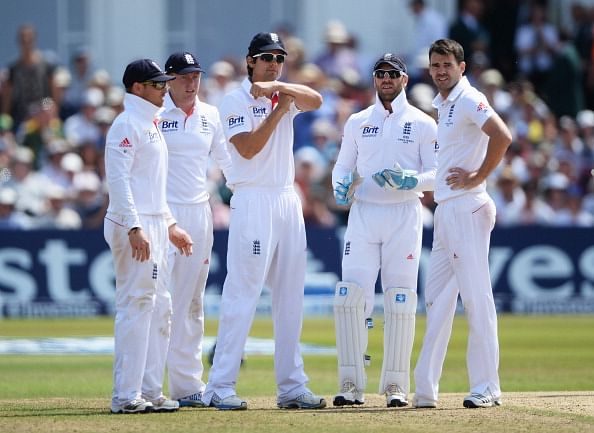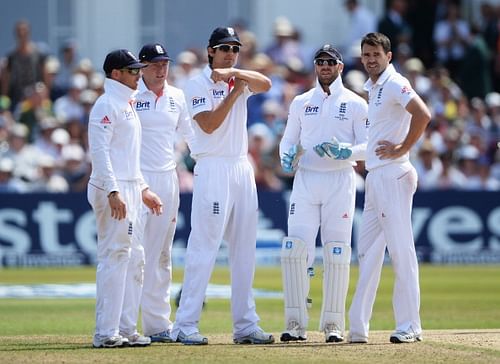
The Ashes 2013: The Australians were lucky to have come so close at Trent Bridge

For many who followed the first Ashes Test at Nottingham, the fact that Australia lost by just 15 runs is evidence that the gap between the sides is not as wide as was suggested. That may be true. But it is worth considering that Australia was able to stay in the game only because of two last wicket partnerships: Phillip Hughes and Ashton Agar combined for a record 163 runs in the first innings, and Brad Haddin and James Pattinson brought the visitors close to victory by adding 65.
Now it has to be agreed that this is not a recipe for future success – batsmen coming in at 11 cannot consistently be expected to bat for hours and to play in the manner that Agar did in the first innings. Tail-enders cannot be expected to provide runs where their more celebrated brethren have failed; world-record, last-wicket unions do not occur very often.
Of course it could be argued that it was the inadequacy of England’s attack that allowed tail-enders to be so fruitful. But that would be an indictment on the Australian top and middle order that saw them reduced to 117/9 in the first innings and 231/9 in the second.
The truth is that although Australia’s pacers strove manfully, the England attack was better balanced and overall superior to that of their opponents. James Anderson swung the ball spitefully in both innings and secured the man-of-the-match award with match figures of 10/158. This prompted charges that England was much too reliant on the skilled pacer. That, in my humble opinion, is ludicrous. Anderson is the leader of their attack so it is natural that most of the responsibility for wickets falls on him.
However, different players have stepped to the fore at different times, and it should be remembered that in the game prior to this first Ashes Test it was Graeme Swann who took 10 wickets, while the one before that was brought to an abrupt end by Stuart Broad’s 7/44 which blew away the New Zealanders for 68.
If Anderson maintains his Trent Bridge form for the entire series then Michael Clarke and the rest of the Australian batting is in for a torrid time. There can be little doubt that he is currently the best swing bowler in the world. With new ball and old, the Lancastrian is able to do things with the leather that most others can only dream about, and the Australian batsmen will need to handle him with great care.
Failure to adequately combat Anderson and the rest of the England attack will leave the tourists with no chance of coming from behind. Australia’s pace bowling, though slightly wayward at the beginning of the game, showed signs that they could pose problems to the opposition’s batsmen. But while England has one of the game’s best spinners in its ranks, Australia has a relative novice who debuted in the first Test and who, if his Trent Bridge performance is anything to go by, could prove to be more of a batsman than a bowler.
England have decided to play the same team when they turn up at Lord’s on July 18 for the second Test. Australia could well do the same. The place most in jeopardy seems to be that of Ed Cowan, but it would be unfair to drop the former opener after a single Test match; he should at least be given another chance.
No matter which team is asked to turn up for the visitors at Lord’s, it will have a very difficult time overcoming a superior England side. Great player that he is, Michael Clarke, Australia’s lone great batsman, is expected to get runs at some point; but when it comes to run gluttons, England clearly outnumber their rivals.
Ian Bell’s form was worrisome going into the game and so his hundred, one of the best of his career, was heartily welcomed by his colleagues, and it is inconceivable that Alastair Cook, Kevin Pietersen and Jonathan Trott will not impose themselves upon the opposition at some point during the series.
All of this spells trouble for Australia. They came so close to winning the first Test that many, including former spin wizard Shane Warne, have said that England were lucky to have escaped. My take is that the Australians were lucky to have come so close. It is unlikely that their bowlers will again be their main source of runs and that is the reason they came so close at Trent Bridge. And if they point to unfortunate umpiring decisions, as some have, then it should be mentioned that Trott should probably have not been given out in the second innings.
That said, while England will continue to be favourites to win, the Australians cannot be counted out. If they manage to come from behind to win the series it will be one of the greatest triumphs in their history.